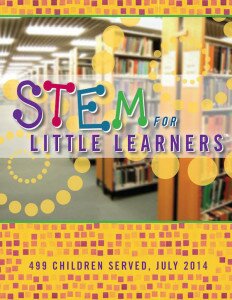STEM FOR LITTLE LEARNERS: Fear of the DARK
Fun STEM activities for story time or anytime. This video will teach you how to facilitate and replicate STEM learning sessions for young children 2-8 years old in your library or classroom. We provide you with a peek in to a real life early childhood learning experience as it unfolds. This is an insider’s view in to the unpredictable nature of teaching young children and finding those teachable moments to further children’s learning.
WHAT IS STEAM? STEAM is an educational approach to learning that includes Science, Technology, Engineering, the ARTS and Mathematics.
WHY IS STEAM IMPORTANT? Innovation comes from bold new ideas. STEM to STEAM approaches to learning provides young children with a process to wonder, critique, inquire and innovate which shapes young children’s ability to solve tomorrow’s problems and become a 21st Century leader.
HISTORY
In the summer of 2014, STEM for Little Learners™ was piloted in ten libraries throughout the Chicago area. We served 499 children with great praise and results. We served children from birth to age 11 years during the pilot. Young children learned to ask questions they never considered before; to discern appearance from reality; to collaborate to create bigger pools of light to experiment with shadows; to observe how the light can change shape and color depending on where it is focused; that flashlights and tape recorders are technical devices; that engineers plan how a device will turn on and off (and that hitting the device on the floor is not something an engineer would plan). We learned, there is always more to learn about meeting the interests and needs of children- as we asked children to describe their documentation and drawings on their pillowcases- so, we could crack the culture code for each of the communities and families we visited. Most importantly, we demonstrated and modeled for the librarians, children and families alike how learning happens through relationships and to create lifelong learners, we need to teach and focus on concepts so young children can make sense of their world for now and for always. Questioning, predicting, observing and exploring are the foundation to STEM learning and can be taught in developmentally appropriate ways in early childhood.






